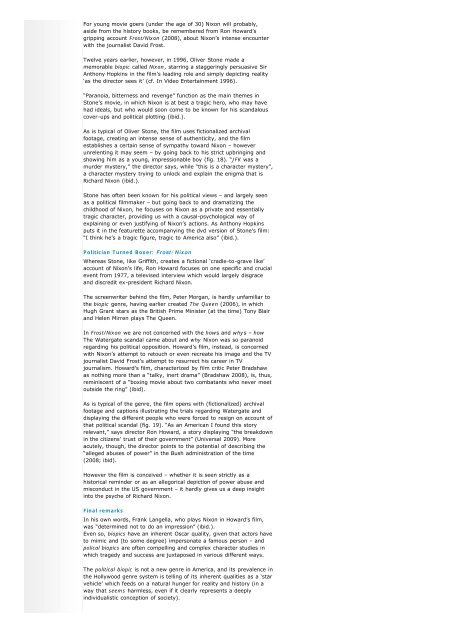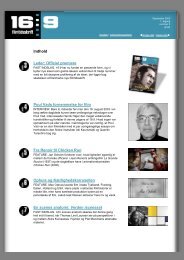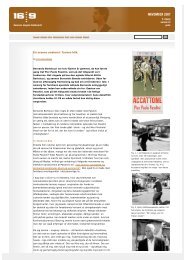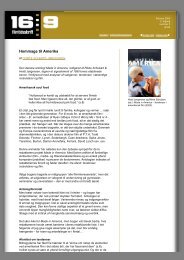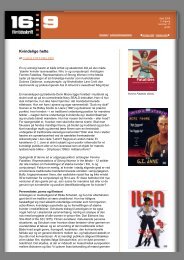Create successful ePaper yourself
Turn your PDF publications into a flip-book with our unique Google optimized e-Paper software.
For young movie goers (under the age of 30) Nixon will probably,<br />
aside from the history books, be remembered from Ron Howard’s<br />
gripping account Frost/Nixon (2008), about Nixon’s intense encounter<br />
with the journalist David Frost.<br />
Twelve years earlier, however, in 1996, Oliver Stone made a<br />
memorable biopic called Nixon, starring a staggeringly persuasive Sir<br />
Anthony Hopkins in the film’s leading role and simply depicting reality<br />
‘as the director sees it’ (cf. In Video Entertainment 1996).<br />
“Paranoia, bitterness and revenge” function as the main themes in<br />
Stone’s movie, in which Nixon is at best a tragic hero, who may have<br />
had ideals, but who would soon come to be known for his scandalous<br />
cover-ups and political plotting (ibid.).<br />
As is typical of Oliver Stone, the film uses fictionalized archival<br />
footage, creating an intense sense of authenticity, and the film<br />
establishes a certain sense of sympathy toward Nixon – however<br />
unrelenting it may seem – by going back to his strict upbringing and<br />
showing him as a young, impressionable boy (fig. 18). “JFK was a<br />
murder mystery,” the director says, while “this is a character mystery”,<br />
a character mystery trying to unlock and explain the enigma that is<br />
Richard Nixon (ibid.).<br />
Stone has often been known for his political views – and largely seen<br />
as a political filmmaker – but going back to and dramatizing the<br />
childhood of Nixon, he focuses on Nixon as a private and essentially<br />
tragic character, providing us with a causal-psychological way of<br />
explaining or even justifying of Nixon’s actions. As Anthony Hopkins<br />
puts it in the featurette accompanying the dvd version of Stone’s film:<br />
“I think he’s a tragic figure, tragic to America also” (ibid.).<br />
Politician Turned Boxer: Frost/Nixon<br />
Whereas Stone, like Griffith, creates a fictional ‘cradle-to-grave like’<br />
account of Nixon’s life, Ron Howard focuses on one specific and crucial<br />
event from 1977, a televised interview which would largely disgrace<br />
and discredit ex-president Richard Nixon.<br />
The screenwriter behind the film, Peter Morgan, is hardly unfamiliar to<br />
the biopic genre, having earlier created The Queen (2006), in which<br />
Hugh Grant stars as the British Prime Minister (at the time) Tony Blair<br />
and Helen Mirren plays The Queen.<br />
In Frost/Nixon we are not concerned with the hows and whys – how<br />
The Watergate scandal came about and why Nixon was so paranoid<br />
regarding his political opposition. Howard’s film, instead, is concerned<br />
with Nixon’s attempt to retouch or even recreate his image and the TV<br />
journalist David Frost’s attempt to resurrect his career in TV<br />
journalism. Howard’s film, characterized by film critic Peter Bradshaw<br />
as nothing more than a “talky, inert drama” (Bradshaw 2008), is, thus,<br />
reminiscent of a “boxing movie about two combatants who never meet<br />
outside the ring” (ibid).<br />
As is typical of the genre, the film opens with (fictionalized) archival<br />
footage and captions illustrating the trials regarding Watergate and<br />
displaying the different people who were forced to resign on account of<br />
that political scandal (fig. 19). “As an American I found this story<br />
relevant,” says director Ron Howard, a story displaying “the breakdown<br />
in the citizens’ trust of their government” (Universal 2009). More<br />
acutely, though, the director points to the potential of describing the<br />
“alleged abuses of power” in the Bush administration of the time<br />
(2008; ibid).<br />
However the film is conceived – whether it is seen strictly as a<br />
historical reminder or as an allegorical depiction of power abuse and<br />
misconduct in the US government – it hardly gives us a deep insight<br />
into the psyche of Richard Nixon.<br />
Final remarks<br />
In his own words, Frank Langella, who plays Nixon in Howard’s film,<br />
was “determined not to do an impression” (ibid.).<br />
Even so, biopics have an inherent Oscar quality, given that actors have<br />
to mimic and (to <strong>som</strong>e degree) impersonate a famous person – and<br />
polical biopics are often compelling and complex character studies in<br />
which tragedy and success are juxtaposed in various different ways.<br />
The political biopic is not a new genre in America, and its prevalence in<br />
the Hollywood genre system is telling of its inherent qualities as a ‘star<br />
vehicle’ which feeds on a natural hunger for reality and history (in a<br />
way that seems harmless, even if it clearly represents a deeply<br />
individualistic conception of society).


